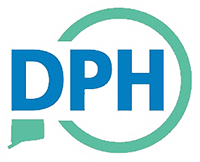HARTFORD, Conn. – State officials from Connecticut Department of Public Health (DPH) and Connecticut Department of Agriculture (CT DoAg) are urging consumers to be aware of the potential risks associated with consumption of raw milk. Raw milk can carry harmful bacteria or viruses that may pose serious health risks. If you choose to purchase and drink raw milk, keep the following in mind.
Make Informed Choices
- If you choose to drink raw milk, understand the risks.
- Avoid raw milk if you or a family member are at higher risk of serious illness.
- Source raw milk from farms that are appropriately licensed.
- Ask your retailer about their sourcing practices, testing protocols, and how they handle and store raw milk.
- Be aware of health advisories or warnings related to raw milk consumption in your area.
Verify Producer/Farm Licensing & Labeling
It is legal to sell raw milk in Connecticut; however, producers are required to have an active retail raw milk producer license. Before purchasing or consuming raw milk, ensure that the producer or farm is appropriately licensed. Here’s how to confirm:
- Visit elicense.ct.gov
- Click ‘Generate Roster(s)’
- Expand ‘Agriculture’ by clicking ‘+’
- Select ‘Raw Milk Producers’, scroll to bottom of screen and hit ‘Continue’
- Select your file format and hit ‘Download’
- Review the roster of Raw Milk Producers to ensure that your farm is listed and currently licensed
Raw milk containers should be clearly labeled and must include the following information:
- Product Name: “Raw Cow’s Milk” or “Raw Sheep Milk” or “Raw Goats Milk”
- Product Information: Name, address, zip code of the farm that produced the raw milk.
- Net volume: amount of milk in the container
- Consumer advisory statement: “Raw milk is not pasteurized; pasteurization destroys organisms that may be harmful to human health.”
- Sell by date: the last date the milk can be sold, which is calculated by adding up to seven (7) days to the bottling date
CT DoAg personnel regularly inspect raw milk producers/farms and perform quarterly quality testing. If pathogens or inhibitors are found, the milk may be recalled, or a stop sale notice issued.
What Is Pasteurization?
Pasteurization is a process that removes harmful pathogens by heating milk to a high enough temperature for a specific length of time. Raw or unpasteurized milk can be a source of foodborne illness. While good practices on farms can reduce contamination, they cannot guarantee safety from harmful pathogens. Pasteurized milk offers the same nutritional benefits without the risks of raw milk consumption. Choosing pasteurized milk is the best way to keep you and your family safe.
Health Risks
Raw milk can harbor bacteria such as E. coli, Salmonella, Campylobacter, and Listeria, which can lead to foodborne illnesses. These infections can cause severe gastrointestinal symptoms such as abdominal pain, vomiting, and diarrhea and, in some cases, can be life-threatening. Children, especially those under 5, pregnant women, adults over 65, and those with weakened immune systems are at higher risk of serious illness.
If you experience any of the above symptoms following consumption of raw milk, please contact your health care provider.
FOR MEDIA INQUIRIES:
CT DoAg: Rebecca Eddy, Rebecca.Eddy@ct.gov; 860-573-0323
CT DPH: Chris Boyle, Christopher.Boyle@ct.gov; 860-706-9654


